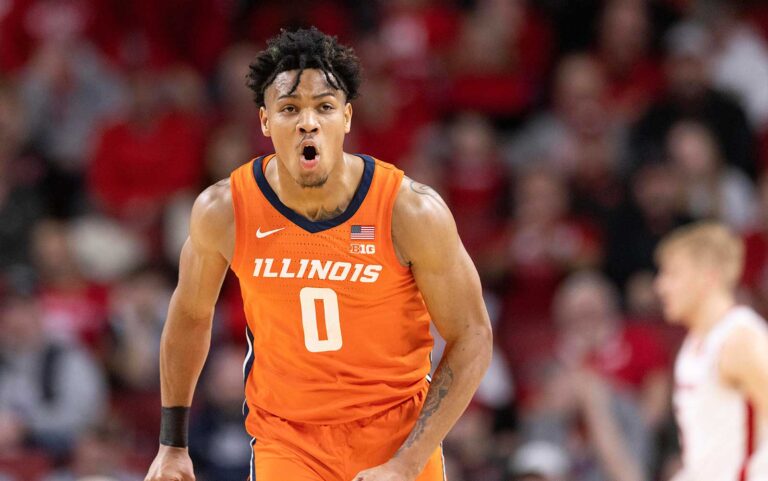SPRINGFIELD – A federal judge in Springfield is promising an “expedient” ruling in Illini basketball star Terrence Shannon Junior’s request to undo his suspension, after being charged with rape.
Judge Colleen Lawless heard about 80 minutes of oral arguments on Friday from attorneys representing 23-year-old Shannon and the University of Illinois Urbana-Champaign. She said she needed to review the relevant case law before issuing her decision.
Attorneys for Shannon declined to comment after the hearing. The University of Illinois released a statement: “We appreciate the opportunity to present our response to the filings, and we await the Court’s Order.”
Shannon has been Illinois’ leading scorer this season, averaging 21.7 points per game. But the university suspended Shannon from play on December 27, after he was charged earlier that month with rape (or an alternative count of sexual battery) by Douglas County (Kansas) authorities.
The charges were in connection with an alleged incident at a bar in Lawrence, Kansas in September. Shannon was in Lawrence to attend an Illinois football game, but the university says he was not there on a university-sponsored trip. However, Shannon’s attorneys say Illinois’ coaching staff knew about the trip, and assigned a UIUC employee to go with him and help with driving.
Shannon denies the rape allegations. He is asking the court to issue a temporary restraining order to halt the suspension so he can resume play. His attorneys argue that his criminal trial in Kansas would not take place until after the current basketball season is over, threatening his potential NBA career.
Shannon’s case: university misses potential harm of suspension
Shannon was present at Friday’s hearing, but did not speak in court, or talk to reporters afterwards. At the hearing, attorneys Robert H. Lang and J. Steven Beckett argued that the university, in their process to decide on the suspension, only considered the potential harm that the criminal charge posed to the UIUC’s reputation.
Lang said the process used by the university to decide on Shannon’s suspension neglected the principles of due process and presumption of innocence, and the impact on his career prospects.
“He was punished as if he was guilty,” said Lang of the university’s suspension.
Lang also said that by sending someone along with Shannon for the trip to Lawrence, the university triggered federal Title IX policies, which could have changed the outcome of UIUC’s suspension decision.
The university’s case: the impact of suspension is limited.
Attorney Peter G. Land, representing UIUC, said that Title IX did not apply in Shannon’s case. He argued that the university has a duty to protect its reputation, especially when a public figure like Shannon is involved in a criminal case.
Land also noted that Shannon’s suspension is a limited one that only covers team activities, and that he still has access to the university’s athletic facilities.
“The only part of the suspension for Mr. Shannon is athletic participation”, Land told Judge Lawless.
Over thirty people attended Shannon’s hearing at the Paul Findley Federal Building and Courthouse in Springfield. Those included reporters and several teammates from the Illini men’s basketball team. One such player was Illini forward Coleman Hawkins. As he left the courthouse, Hawkins said the delay in a ruling from the judge left him out of sorts.
“Honestly, I was just there to show support,” Hawkins told IPM reporter Mae Antar. “I don’t know really how to feel, because there was no ruling.”
The night before, Hawkins had scored 15 points, as Illinois defeated visiting Michigan State, 71 to 68 at the State Farm Center in Champaign. Hawkins was among five players scoring in double digits Thursday night. It was the team’s 4th game without Shannon, following his suspension by the university.
This story has been updated, to include more details, including additional reporting by Mae Antar. and the university’s comment following the hearing. — JM 12:25 AM, 1/15/24

